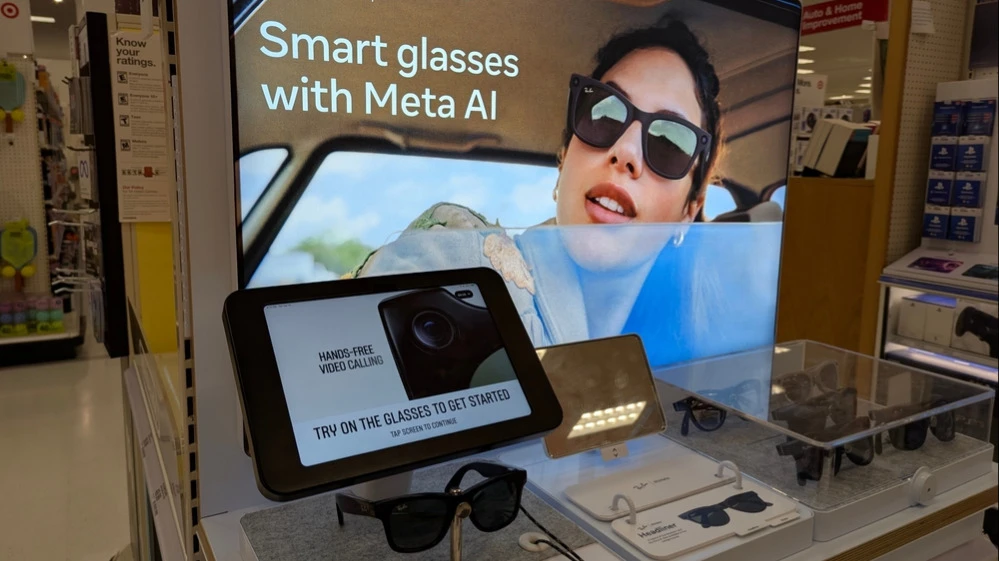Meta will release glasses with a screen and augmented reality. How will this affect the stock?
The release of a new model of glasses controlled from a wristband will help the company reach a $2 trillion capitalization, Barron's believes

The first Meta smartglasses with an augmented reality screen could be released in September and will cost from $800, Bloomberg reported. This is cheaper than expected: the company decided to reduce margins to gain a foothold in the market, he believes. If the novelty is successful, it will not only open an additional source of revenue, but also allow Meta to dominate the segment of wearable devices with AI, notes Barron's. The publication suggested that the release of the new device could push the company's shares up to a capitalization of $2 trillion.
Details
Meta plans to unveil the first display glasses, codenamed Hypernova, as early as September, which will sell for around $800. This was reported by Bloomberg columnist Mark Gurman on the X social network.
"The price was originally expected to exceed $1,000. The decline is partly due to the company agreeing to lower margins to stimulate demand, a common tactic when launching new products," Gurman wrote.
Hypernova will be a "deluxe" version of the regular Ray-Ban Meta with gesture control, the ability to take and view photos, explore maps and read social media notifications on the built-in display, Mashable reported. They will come with an improved camera, a wristband for gesture control, and a new case, the publication added.
Meta shares were down 2.4% to $766.1 at the moment in Monday trading. According to Yahoo Finance, the company's market value is $1.925 trillion.
Why it's important
Meta Platforms has come close to the $2 trillion market capitalization mark amid growing investor interest in its artificial intelligence successes. A new AI-based device could be a catalyst for further growth, Barron's believes.
If the new product is successful, it will not only open up an additional source of revenue, but will also consolidate Meta's dominance in the segment of wearable devices with AI. According to Counterpoint Research, Meta held 73% of the global smart glasses market in the first half of the year.
"Ray-Ban Meta AI Glasses shipments rose more than 200% year-over-year, reflecting strong demand and increased production capacity at [Ray-Ban brand owner] Luxottica, Meta's key manufacturing partner," Counterpoint analyst Flora Tan wrote in a note cited by Barron's.
In June, Meta invested about $3.5 billion in EssilorLuxottica to deepen the partnership and prepare for the release of a rival Android device from Google. Meta's main bet: glasses will be the next step in the development of personal computing and will supplant smartphones as the main way to access AI in everyday life.
"Personal devices like glasses that understand our context because they see what we see, hear what we hear, and interact with us all day long will become our primary computing devices," Meta CEO Mark Zuckerberg wrote on the company's blog on July 30.
Which companies are vying for the wearable device market with AI
- Ray-Ban Meta smart glasses with a built-in camera, but no display, cost from $299. They are limited in functionality: they take photos and videos, record sound and execute simple commands with the help of AI.
- The Meta Quest 3 headset, which is a much bulkier mixed reality (AR) device, is priced from $499.99.
- Apple's Vision Pro, which is an even bulkier but also much more powerful mixed reality headset, costs from $3499. But Apple is working on a cheaper version: possibly new glasses.
- Snap announced that it is preparing to release the sixth generation of glasses under the new Specs brand. According to the company, the novelty will appear in 2026, will support augmented reality technologies and will be smaller and lighter than previous models.
- Other tech giants are betting on alternative formats of AI gadgets. Amazon, for example, is buying the startup Bee, which is developing a wearable bracelet with a monthly subscription. The device records and transcribes the user's entire conversation for the day, and then uses AI to offer to-do lists, reminders and other features.
- OpenAI announced in May that it had bought the startup of Jony Ive, a former chief designer at Apple, for $6.4 billion. While details on future products are not yet available, the first device is expected to be a gadget that complements the smartphone and computer.
- Counterpoint also names Xiaomi, Samsung, Baidu and ByteDance among those who are also looking to enter this market.
According to Counterpoint's calculations published in February, the global smartglasses market grew 210% last year, driven by Meta devices, which accounted for more than half of all shipments. This year, it is forecast to expand by 60% and maintain a steady compound annual growth rate of more than 60% through 2029.
This article was AI-translated and verified by a human editor
